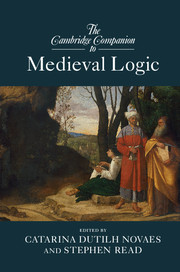Book contents
- Frontmatter
- Contents
- List of Contributors
- Introduction
- PART I PERIODS AND TRADITIONS
- PART II THEMES
- 8 Logica Vetus
- 9 Supposition and Properties of Terms
- 10 Propositions: Their Meaning and Truth
- 11 Sophisms and Insolubles
- 12 The Syllogism and Its Transformations
- 13 Consequence
- 14 The Logic of Modality
- 15 Obligationes
- Bibliography
- Index
8 - Logica Vetus
from PART II - THEMES
Published online by Cambridge University Press: 05 September 2016
- Frontmatter
- Contents
- List of Contributors
- Introduction
- PART I PERIODS AND TRADITIONS
- PART II THEMES
- 8 Logica Vetus
- 9 Supposition and Properties of Terms
- 10 Propositions: Their Meaning and Truth
- 11 Sophisms and Insolubles
- 12 The Syllogism and Its Transformations
- 13 Consequence
- 14 The Logic of Modality
- 15 Obligationes
- Bibliography
- Index
Summary
Logica Vetus (or Old Logic, hereafter LV) is the set of logical works that had been in circulation in the Latin West before the wave of new translations of Aristotle's remaining logical treatises, called Logica Nova (or New Logic, LN), became available. These treatises cover fundamental philosophical issues, including the division of everything into categories, the nature of the relationship between language, thought and reality, the structure of linguistic terms and sentences, the character of definitions, the status of universals, modal reasoning, and the nature of truth, to name just the big topics. LV is sometimes thought of as Boethian logic, since all but one of the texts were made available by the hand of the fifth-century Boethius (c. 480–525/6). Boethius aimed to translate from Greek to Latin all the works of Plato and Aristotle and to provide detailed commentaries on them, although only Aristotle's Categories and On Interpretation, as well as an introduction to the Categories, called Isagoge, written by the third-century Neoplatonist Porphyry (c. 234–c. 305), were transmitted to the Latin West. Medieval scholars also inherited from Boethius lengthy commentaries written to explain every line of the original material and, since Boethius’ habit was to refer to other ancient commentators’ critical arguments and interpretations when giving his own, these commentaries preserved a rich heritage of the late ancient reception of Aristotelian logic. In addition to Isagoge, Categories and On Interpretation, the LV included a twelfth-century treatise written to supplement Categories, known as Book of Six Principles (Liber de sex principiis, hereafter LSP). While other Boethian treatises were included in this set in the twelfth century, they gradually fell out of circulation when the LN became available.
The texts of LV played a major role in university instruction. Taking note of how they were studied provides insight into the ways they were interpreted. Accordingly the first section of this chapter will outline the ways this material was used by masters and students. Given that philosophers often engaged in metalogical reflections about the subject matter of logic itself, a brief review of the principal shifts in the characterizations of logic during this period will follow.
- Type
- Chapter
- Information
- The Cambridge Companion to Medieval Logic , pp. 195 - 219Publisher: Cambridge University PressPrint publication year: 2016
- 2
- Cited by



